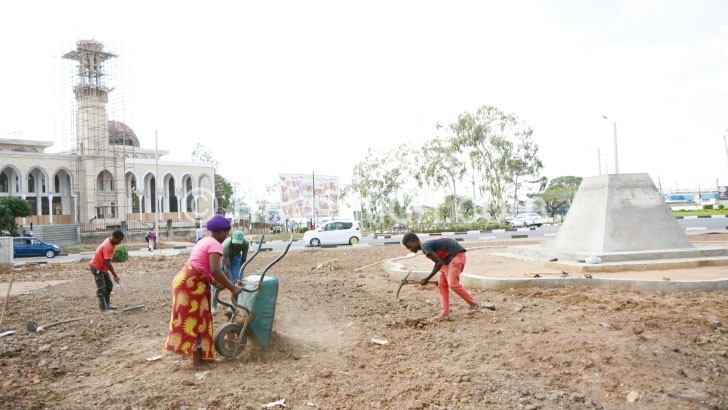A statue of Mahatma who?
At Ginnery Corner in Blantyre, labourers are sweating in the scorching sun to clear the ground for a monument of a man most of them do not know.
On Sunday, we saw about 15 working more than eight hours at a site where a bronze look-alike of Mahatma Ghandi will sit for travellers on Masauko Chipembere Highway to see.
“All I have heard about this man is that he is like the leader of all Indians. They say he came to Malawi to negotiate with [founding president] Kamuzu Banda to allow Indians to stay in Malawi,” said one of them.
However, the worker is unaware that the Indian political and religious icon never set foot in Malawi.
“Mahatma who” he asked.

This is one of the reasons the monument has drawn petitions and ignited a social media backlash.
The workers, who do not rest on weekends, have more than halved a time-honoured eucalyptus forest where displaced crows now scramble to nest in fewer surviving trees nearby.
The Indian Government wants Gandhi’s bust erected in exchange for a $10 million convention centre in Blantyre.
Chasing time
Now, the workers are racing against the time. Some dig the ground with picks with others shovelling the soil away. Yet others push wheelbarrows, emptying wet concrete on the cleared space. Also in the mix are women carrying bucketfuls of water on their heads, on arrival from a stream.
These people are working all week in the gruelling race against time.
“Our bosses want the job completed by month-end,” says a youthful labourer, who does construction piecework in the commercial city.
For the past three weeks the workforce has dug the soil, mixed cement with sand, uprooted stumps and built a slab where Ghandi’s bronze will perch.
But most of the workers do not know who Gandhi was—and they can hardly pronounce his full name.
They are just hearing the name from those demanding a stop to the project where they work from as early as 7am to 5pm when they knock off.
“We come here every day, even on public holidays and Sundays when most of us go church. The owners want to install the statue this month,” recounted the young Malawian.
He admittedly quit school in Form One, too early to learn the history of Gandhi’s struggle in South Africa and India. He stammered and mumbles when asked to pronounce ‘Mahatma Gandhi’.
Gandhi died in 1948 without stepping in Malawi, a sticky point that has enraged the petitioners demanding that the emerging monument must fall.
To critics, the man portrayed as racist in posthumous literature has nothing to do with Malawi, let alone the city where the monument is under construction.
Indian High Commissioner Suresh Kumar Menon says his government is financing a ‘bust’ of the man revered as Mohandas—a servant of the Hindu God, Mohana.
When asked, the ground workers said they would have loved to see a statue of a Malawian hero on the site opposite a mosque under construction.
They took turns, naming Kamuzu, pioneer nationalist John Chilembwe, first post-dictatorship president Bakili Muluzi and multiparty herald Chakufwa Chihana among those deserving the honour.
However, they say it does not matter whose bronze will occupy the site they are clearing without a lunch break.
“As long as this gives us a job and some money, we are fine,” said another worker, for the country is struggling with massive unemployment.
The International Labour Organisation (ILO) of the United Nations estimates that over a quarter of employable youthful Malawians are jobless.
Gandhi’s monument has displaced some businesses, including a take-away food shop.
“Under the cover of darkness, city council rangers came to demolish the shop, taking away the equipment that was inside. Where are we going to buy affordable meals now,” says Patrick Dotolo, who sells airtime close-by.
One encounters ignorance of Gandhi and anger over his statue in conversations of people buying airtime and making mobile money transactions on the roadside.
“Why don’t they put a statue of a Malawian? Don’t we have any deserving achiever?” asks a woman scratching a card.
Just then, seven passers-by, wearing blue overalls, hurl obscenities at the men working on the contentious monument.
“We will pull it down if you dare erect your statue,” one man shouts.
Clearly, he has no business with it. Mass outrage led to the defacing of Gandhi’s statue in South Africa and Ghana’s government has agreed the one at the University of Ghana in Accra must fall.
The workers in Blantyre are getting accustomed to taunting stares and angry outbursts from passersby.
“We hear a lot, but we are only doing our job,” one of the workers said.
Over 3 000 Malawians have signed an online petition to stop erecting the Indian-funded monument.
But Government of Malawi has issued a press statement, saying the bust will strengthen the good relations with India.
Socio-economic gains
Ministry of Foreign Affairs and International Cooperation spokesperson Rejoice Shumba said the project promotes Gandhi’s values of simplicity and the fight against social evils.
“Malawi government accepted a request from the Indian Government to construct the Mahatma Gandhi Square in recognition of his contribution to the fight against colonialism and promotion of human rights and social development for the underprivileged,” she says.
However, the passers-by casting inquisitive looks and insults at the concrete awaiting Gandhi’s bronze head wonder why the men are working hard in the summer sun for a statue whose person they hardly know.





